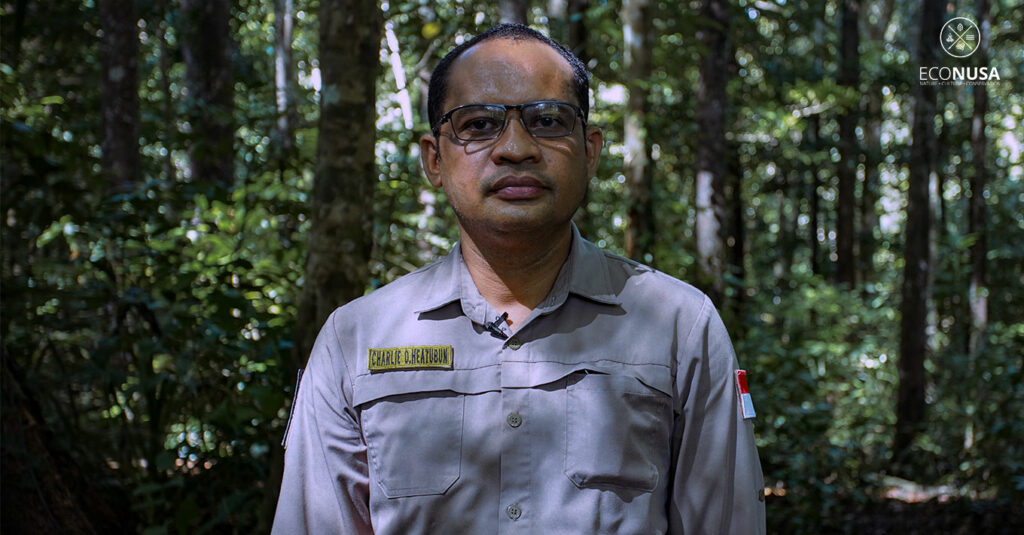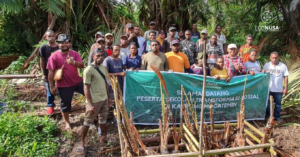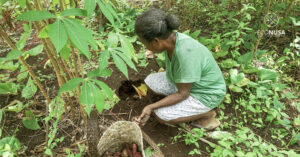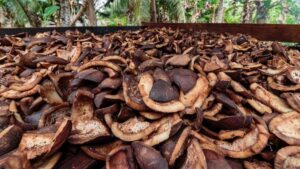
As an academic and local government official Charlie D. Heatubun should go back and forth into jungle for research. He is a professor of School of Forestry’s Botany and Forest Resources of Papua University and Head of West Papua’s Research and Development Agency. This background has given him strong belief that forest is irreplaceable. There is no technology that could change meaning and role of forest. Forest is a “mother” that nurtures priceless love to the community. Forest is the source of cultural inspiration. Forest is the playground that fascinates researchers.
“As to me, forest is a captivating world. When I am in the forest, all problems are gone swiftly, and I have tranquil feeling. It is really inspiring moment so I could produce beneficial works,” said Charlie when met EcoNusa at Gunung Meja Ecopark in Manokwari, West Papua, in mid of June 2021.
Along with his life, Charlie is familiar with forests. He is a flora researcher focusing on palm vegetation or Arecaceae family. When he acted as a honorary researcher and visiting professor at the UK’s Royal Botanic Garden of Kew, Charlie conducted a study on Papuan forests and found new areca nut species.
Read also: Locals Deceived by Questionable Palm Oil License
He called the novel finding as Pinang Unipa (Areca unipa) which was published in the Phytotaxa journal in 2013. Two years before, Charlie had found seven new areca nut species and five of them was endemic species of Kalimantan. Those findings were published in the Phytotaxa journal September 2021 edition.
As an appreciation to President Joko Widodo’s effort for the development of Tanah papua, Charlie gave a name of President Jokowi on the areca species found at the valley of Mount Daweri, Nabire Regency, Papua Province. The Jokowi areca nut (Areca Jokowi Heatubun) was published in the Phytotaxa journali in 2016.
The findings of various new species by Charlie and other researchers would not happen without healthy forest condition. The two provinces in eastern Indonesia serve as the last frontier of tropical rainforest in Indonesia because forests in Sumatera, Kalimantan, and Sulawesi have been degraded due to land use change.
Conserving Nature
Upon realizing that natural resources are the primacy and identity of the community, West Papua Province proclaimed itself as the Province of Conservation in October 2015 as those of the case in Gorontalo and East Kalimantan Provinces. Abraham O. Atururi, the Governor of West Papua at the time, was willing to use natural resources in responsible way.
The commitment of natural resource protection keeps going with the event of the International Conference on Biodiversity, Ecotourism and Creative Economy (ICBE) 2018. ICBE could produce commitments of West Papua and Papua with Manokwari Declaration. Both provinces agreed to run sustainable development in Tanah Papua based on customary areas.
Manokwari Declaration was endorsed by the deliberation of Special Bylaw (Perdasus) No. 10/2019 on Sustainable Development in West Papua and Perdasus No. 9/2019 on the Guidelines of Recognition, Protection, Empowerment of Indigenous Peoples and Land. “We try to perform the development wisely. The other region attempts to improve their economy by extraction of natural resources, but we think on the other way around,” said Charlie.
Read also: Protecting Papua and Maluku Forests Not Only About Birds-of-Paradise Preservation
From classical economy viewpoint, West Papua is deemed a ‘weird’ province. In the Manokwari Declaration, it mentioned that the spatial planning of West Papua accommodates 70 percent of land and 50 percent of water as the protected areas. As the second poorest province in Indonesia, providing welfare to the native Papuan peoples while performing the Manokwari Declaration commitment are like seeking a needle in the haystack.
However, in terms of sustainable development viewpoint, the Manokwari Declaration commitment is easily understood. West Papua with its 24.8 million hectare of forest (data of the Ministry of Environment and Forestry in 2018) has multifarious priceless richness in the forests.
The publication on the Nature journal by researchers across countries found that Papua Island has shifted Madagascar as the island with the highest flora biodiversity. There are 13,364 flora species and 68 percent of them is endemic species of Papua Island. Meanwhile, Madagascar has 11,888 flora species.
Climate Crisis
In addition to flora, there are also 716 bird species, 125 mammalians, and 223 reptiles. Cenderawasih, bird species from Paradisaeidae family, also exists in the Papuan forests. As from around 40 species, 28 species live in Tanah Papua and Maluku Island. The other 4 species was only found at Arfak Mountain in West Papua.
“My favorite cenderawasih is Parotia Arfak (Parotia sefilata). On the display, it is like dancing and that is the reason they are called ‘ballerina from Arfak Mountain’. The biodiversity will keep growing because there are still many places left unexplored. The highlight is that the need for biodiversity conservation due to its contribution in relation to the global climate crisis,” said Charlie.
Read also: Igya Ser Hanjop, Arfak Tribe’s Ecological Management
If the temperature continues to rise up to 2 Celsius degrees, the climate crisis will bring about massive impacts to Tanah Papua. The impact will not only affect the loss of biodiversity but also the local culture and indigenous people. Charlie and some other researchers created a simulation of climate crisis up to 2070 through a study on Climate Change Threatens New Guinea’s Biocultural Heritage on Science Advance journal.
The study predicts the extinction of endemic flora species in Papua Island. The highland endemic flora will extinct due to the warming temperature. The lowland flora will invade highland flora. As a result, indigenous people will lose their resources for food, culture, and language due to the extinction.
“Climate crisis should be followed up immediately. We should take prompt action, reduce, and prevent the worst fact that might happen. It deals with the identity and entry point for studying culture of various flora, particularly related to cultural rite, traditional medication whose substance has so far not been known yet,” Charlie remarked.
Editor: Leo Wahyudi & Nur Alfiyah







